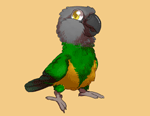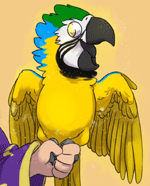 Kili
Type: Senegal Parrot
Genus: Poicephalus
Species: Senegalus
Subspecies: Mesotypus
Sex: Female
Weight: 120 grams
Height: 9 inches
Age: 17 years, 8 months
|
 Truman
Type: Cape Parrot
Genus: Poicephalus
Species:Robustus
Subspecies: Fuscicollis
Sex: Male
Weight: 330 grams
Height: 13 inches
Age: 15 years, 11 months
|
 Rachel
Type: Blue & Gold Macaw
Genus: Ara
Species:ararauna
Sex: Female
Weight: 850 grams
Height: 26 inches
Age: 13 years, 8 months
|
List of Common Parrots:
Parakeets:
Budgerigar (Budgie)
Alexandrine Parakeet
African Ringneck
Indian Ringneck
Monk Parakeet (Quaker Parrot)
Parrotlets:
Mexican Parrotlet
Green Rumped Parrotlet
Blue Winged Parrotlet
Spectacled Parrotlet
Dusky Billed Parrotlet
Pacific Parrotlet
Yellow Faced Parrotlet
Lovebirds:
Peach Faced Lovebird
Masked Lovebird
Fischer's Lovebird
Lilian's (Nyasa) Lovebird
Black Cheeked Lovebird
Madagascar Lovebird
Abyssinian Lovebird
Red Faced Lovebird
Swindern's Lovebird
Lories and Lorikeets:
Rainbow Lorikeet
Conures:
Sun Conure
Jenday Conure
Cherry Headed Conure
Blue Crowned Conure
Mitred Conure
Patagonian Conure
Green Cheeked Conure
Nanday Conure
Caiques:
Black Headed Caique
White Bellied Caique
Poicephalus Parrots:
Senegal Parrot
Meyer's Parrot
Red Bellied Parrot
Brown Headed Parrot
Jardine's Parrot
Cape Parrot
Ruppell's Parrot
Eclectus:
Eclectus Parrot
African Greys:
Congo African Grey (CAG)
Timneh African Grey (TAG)
Amazons:
Blue Fronted Amazon
Yellow Naped Amazon
Yellow Headed Amazon
Orange Winged Amazon
Yellow Crowned Amazon
Cockatoos:
Cockatiel
Galah (Rose Breasted) Cockatoo
Sulphur Crested Cockatoo
Umbrella Cockatoo
Moluccan Cockatoo
Bare Eyed Cockatoo
Goffin's Cockatoo
Macaws:
Red Shouldered (Hahn's) Macaw
Severe Macaw
Blue And Gold Macaw
Blue Throated Macaw
Military Macaw
Red Fronted Macaw
Scarlet Macaw
Green Winged Macaw
Hyacinth Macaw
Glossary of Common Parrot Terms
|
| | Friday November 1st, 2013 |
|
Stress is necessary for your parrot's well-being. "Whoa, did he really just say that!?" Let me talk about stress and why it's important to expose our parrots to it rather than to shelter them.
I talk to many parrot owners and get to experience stressed parrots. In most cases, the parrots that are overwhelmed with stress (which may manifest itself as plucking, pacing, biting, freaking out, etc) are the ones who were not sufficiently exposed to it in the past. To contrast, my parrots have a good dose of stress and strain in their lives. So when something scary happens, they can keep a head on their shoulders and deal with it rather than becoming overwhelmed.
As you challenge your parrot with more stressful situations (that are absurdly rare and unlikely to recur), you will actually ensure that your parrot lives with much less stress in its day to day life! Think of it as watching enough scary movies that nothing in ordinary ones can scare you. This concept prepares your parrot to deal with rare difficult situations and also makes it immune to excess fear during all normal routines.
Now I'm not saying to suddenly take a sheltered parrot and to start doing all sorts of scary things to it at once. Stress tolerance needs to be built up gradually. You can do this by constantly challenging your bird a little more than before. If you maintain this as part of your lifestyle, within a few years the bird will become much more hardy. Let me get into examples of good ways to stress your parrot to save it from being harmed by stress in the future.
A degree of stress in a parrot's life is perfectly natural. In the wild, parrots will have to deal with stressful situations from time to time. So if anything, the annihilation of stress in a captive parrot's life is the less natural lifestyle. The parrot that lives in a sheltered cage, with a bowl full of food, and no changes in its life is at highest risk of stress related problems. Likewise, boredom (and related problems like screaming or plucking) is a byproduct of insufficient stress in a parrot's life.

Instead, prepare your parrot to deal with stress in its life through a controlled and continued exposure to stress inducing situations. Providing challenges through foraging and training, socialization, travel, and outings, are great ways to apply modest amounts of stress on a parrot that will prepare it for more.
Folks marvel at how my parrots could venture all over New York City without being scared. I've received many comments of amazement how a fire truck went by and my parrots were not even phased. This is because they have been exposed to similar situations in the past. Even if they haven't seen a fire truck before, they have been to carnivals and other bustling situations in the past. This deliberate exposure to stress has ensured that they do not become overwhelmed in unforeseen circumstances. Not only that, but it has equipped them to enjoy and have fun in all the travel and things we do. Since these things are no longer frightening, they counteract boredom and improve the parrots' quality of life.

I also physically stress my parrots and improve their endurance through extensive flight training. At home, the two trained parrots regularly end up flying dozens of flight recalls. This is tough on their cardio-respiratory systems as much as on their muscles. But this keeps them fit and healthy.
I extend this concept even further. I don't worry much about my parrots. I don't tiptoe around their cages or fiddle with temperature controls too much. While at first, these may have been greater concerns, with time I've allowed them to get used to more variation. They have learned to deal with it and not be bothered. If food or water isn't available while we're traveling a bit longer than usual, they have no trouble dealing with it. Or if the food I have for them is not what they are used to, they are adaptive and can try the new food on the spot. Whether an emergency, or a planned life change, a parrot that is accustomed to dealing with stress in the long term, will be best prepared and least affected.
Part of: Taming & Basic Training, Health, Nutrition, and Diet, General Parrot Care
Parrot Stress Change Travel Emergency Preparation Socialization |
|



 Previous Article
Previous Article Next Article
Next Article